- 6 hours ago
- Latin America & Caribbean
출처: http://www.bbc.com/news/world-latin-america-36294939
Venezuela crisis: Maduro threatens seizure of closed factories (seizure: 압수, 몰수, 장악, 점령)
The Venezuelan president, Nicolas Maduro, has threatened the seizure of factories that have stopped production and the jailing of their owners.
In a speech to supporters in the capital Caracas, he said the country had to recover the means of production, to counter its deep economic crisis. 경제를 실패한 사람이 늘상 대는 구실.
On Friday, he introduced a new, nationwide state of emergency. 물리적 통제를 위한 국가비상사태 선포.
Opposition protesters have been rallying in Caracas to push for a recall vote to eject him from power.
Mr Maduro said the state of emergency was needed to combat foreign aggression, which he blamed for Venezuela's problems. 핑계.
And he said military exercises would take place next weekend to counter "foreign threats". 국민을 겁주는 방식.
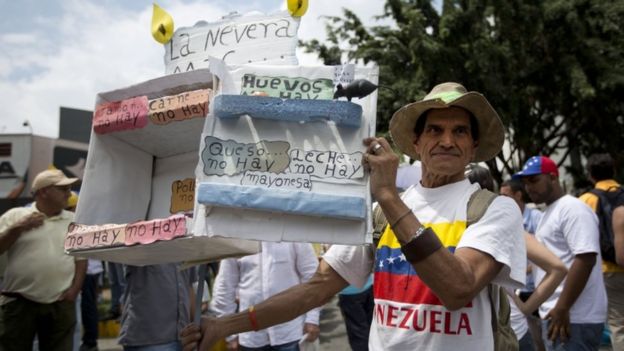 AP
APVenezuela has the world's largest oil reserves but its economy has been severely hit by falling global oil prices. Its economy contracted by 5.7% last year and its official inflation rate is estimated to be topping 180%. 베네주엘라는 세계최대 석유매장 국가. 그러나 경제는 국제유가하락으로 심각한 타격을 입음. 작년 5.7% 경제 감소, 인플레이션은 180%.
There are severe shortages of food, medicines and basic goods which Mr Maduro argues are due to business leaders and the US waging an economic war against his government. (wage: 전쟁 등을 벌이다) 음식, 의약품, 기초생활필수품의 부족이 심각한 상태. 그 원인은 미국의 베네주엘라 정부에 대한 경제전쟁 때문이라고 마두로는 인식.
Feeling the strain: Analysis by Daniel Pardo, BBC Venezuela correspondent, Caracas (strain: 부담, 압력)
 REUTERS
REUTERSThe economic crisis that started three years ago has exacerbated this year, to the point that it has affected immensely the day-to-day life of every Venezuelan. (exacerbate: 악화시키다)
On top of having to queue for hours every week to be able to buy the basic products, now Venezuelans have to cope with energy and water rationing almost daily. (ration: 배급. 배급하다)
This, in a country that used to be one of the most developed nations in Latin America, with the highest consumption rates in the region. 한 때 남미에서 가장 잘살았던 나라 베네주엘라의 추락.
Venezuelans have lost interest in Mr Maduro's moves because of the economic crisis. The latest, like the state of emergency decree or the occupation of certain plants, are in fact already happening and have changed little for Venezuelans' daily lives.
'All measures'
The threat to seize closed factories came after Venezuela's largest food and beverage company, the Polar Group, halted production of beer, blaming government mismanagement for stopping it importing barley.
The group's billionaire owner, Lorenzo Mendoza, is a fierce critic of President Maduro.
"We must take all measures to recover productive capacity, which is being paralysed by the bourgeoisie," Mr Maduro told a rally in Caracas. (bourgeoisie: '불조와시' 부르조아 중산층)
"Anyone who wants to halt [production] to sabotage the country should get out, and those who do must be handcuffed and sent to the PGV [Venezuelan General Penitentiary]," he said.
"We're going to tell imperialism and the international right that the people are present, with their farm instruments in one hand and a gun in the other... to defend this sacred land," he added.
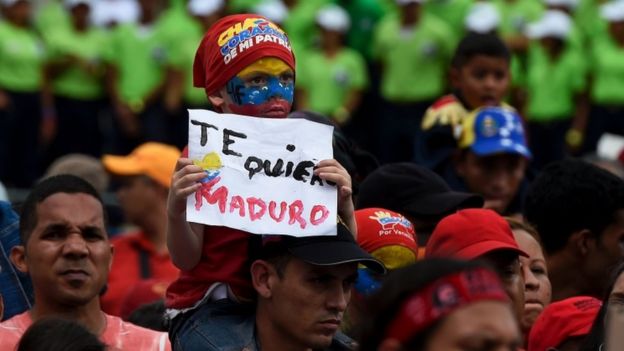 AFP
AFP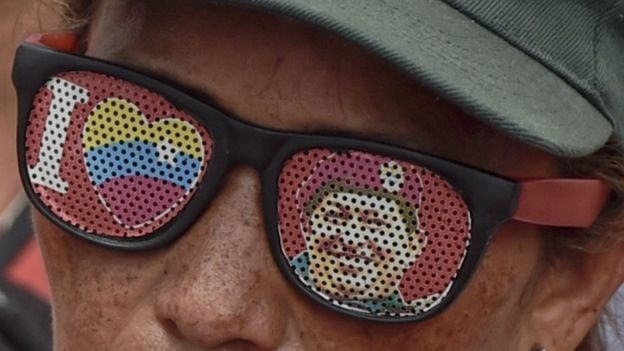 AFP
AFPOn Friday he declared a full-blown state of emergency, expanding the state of "economic emergency" he had announced in January. (full-blown: 완전한)
In an address to the nation, he said the measures would be in place for three months but would likely be extended over 2017.
He did not specify if there would be limits to other constitutional rights but he said the decree would provide "a fuller, more comprehensive protection for our people."
A previous state of emergency was implemented in states near the Colombian border last year.
It suspended constitutional guarantees in those areas but did not suspend guarantees related to human rights.
The Venezuelan Minister for Communication and Information, Luis Jose Marcano, said the state of emergency would allow the government more resources to distribute food, basic goods and medicines.
But he added that it also created "mechanisms for the security forces to be able to guarantee public order needed because of the threats by armed groups".
'Time bomb'
The opposition has collected and submitted a petition with 1.8 million signatures in favour of a referendum on Mr Maduro, but the National Electoral Board (CNE) has so far not verified them.
The verification process was supposed to take five days but 12 days have already elapsed.
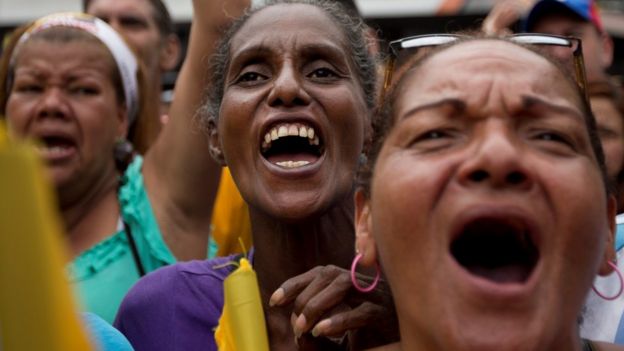 AP
AP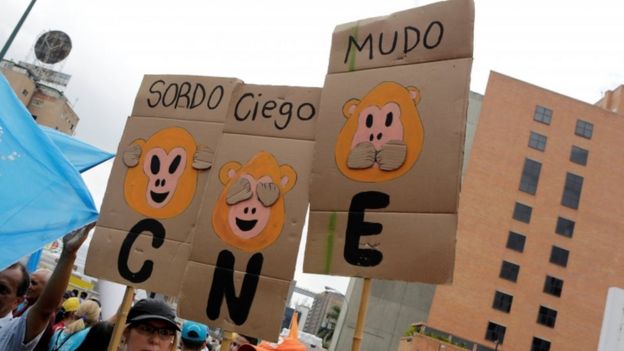 REUTERS
REUTERSOpposition activists say authorities are not letting them proceed to the next stage when they must collect another four million signatures.
Addressing the crowds on Saturday, opposition leader and former presidential candidate Henrique Capriles said: "We want a country without queues, where we can find medicines. We want change."
He described Venezuela as a "time bomb that can explode at any given moment".
According to the Venezuelan Constitution, if a referendum is held before the end of the year, a recall vote against Mr Maduro would trigger new elections.
Opposition protester Marisol Dos Santos said there would be "a social explosion" if Mr Maduro did not let the recall referendum happen.
** 기사에 대한 소감 **
어느 나라나 후진 정치를 행하는 나라는 국민의 정당한 의사표현을 합법을 가장한 무력으로 봉쇄할 수 있다는 어리석은 착각(?)에 빠진다. 베네주엘라의 마두로 대통령이 바로 그 적절한 예이다.
'국제문제 > 남미' 카테고리의 다른 글
| (남미) 파나마정부 1989년 미군의 파나마침공에 대해 진상조사 시작한다 (0) | 2016.08.01 |
|---|---|
| (남미) 콜롬비아 의회 자주 무단결석 하는 의원들의 봉급 깎는 법안 발의 (0) | 2016.06.17 |
| (남미/아르헨티나) 前여대통령 사기혐의 기소 당하다 (0) | 2016.05.15 |
| (남미) 파나마 페이퍼스를 유출한 이유는 "소득 균등"을 실현하고자 (0) | 2016.05.09 |
| (남미/베네주엘라) 베네주엘라 에너지 위기 대응책으로 공공부문 주2일 근무제 실시 (0) | 2016.04.27 |